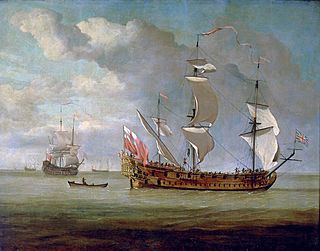HMS Charles Galley (1676) facts for kids
|
The Charles Galley in a painting by Willem van de Velde the Younger; late 17th century.
|
|
Quick facts for kids History |
|
|---|---|
| Name | HMS Charles Galley |
| Builder | Woolwich Dockyard |
| Launched | 1676 |
| Renamed | HMS Torrington in July 1727 |
| Reclassified | Hulked in 1740 |
| Fate | Sold on 12 July 1744 |
| General characteristics as built | |
| Class and type | 32-gun fifth rate |
| Tons burthen | 546 bm |
| Length | 131 ft (39.9 m) (overall) |
| Beam | 28 ft 6 in (8.7 m) |
| Propulsion | Sails |
| Sail plan | Full-rigged ship |
| Armament |
|
| General characteristics after 1693 rebuild | |
| Tons burthen | 548 bm |
| General characteristics after 1710 rebuild | |
| Tons burthen | 537 bm |
| General characteristics after 1729 rebuild | |
| Tons burthen | 594 bm |
HMS Charles Galley was a special warship that belonged to the Royal Navy of Great Britain. It was built a very long time ago, in 1676. This ship was known as a "fifth-rate" ship, which meant it was a medium-sized warship with 32 guns.
Contents
The Charles Galley was built at a place called Woolwich Dockyard. This was a famous shipyard where many important ships for the Royal Navy were made. The ship was launched in 1676, meaning it was put into the water for the first time.
A Ship That Kept Changing
Ships from this time often needed to be rebuilt. This was done to make them stronger, faster, or to update their design. The Charles Galley was rebuilt many times during its long life.
First Rebuild in 1693
The first time the ship was rebuilt was in 1693. This would have involved taking parts of the ship apart and putting them back together with new materials. It helped the ship stay in good condition.
Second Rebuild in 1710
The Charles Galley had another major rebuild in 1710. This time, the work was done at Deptford Dockyard. Each rebuild helped the ship continue its service for the Royal Navy.
Third Rebuild and a New Name
In 1729, the ship went through its third rebuild. After this big change, it was given a new name: HMS Torrington. It was common for ships to be renamed, especially after major overhauls.
From Warship to Hulk
By 1740, the HMS Torrington (which was once the Charles Galley) was no longer used as an active warship. Instead, it was "hulked."
What is a Hulk?
When a ship is "hulked," it means it's stripped of its masts and sails. It's then used as a floating storage space or even as a barracks for sailors. It's like a floating building!
The End of Its Journey
After serving for many decades, first as a warship and then as a hulk, the HMS Torrington was finally sold. This happened on July 12, 1744. Selling a ship meant it was no longer part of the Royal Navy.
 | Mary Eliza Mahoney |
 | Susie King Taylor |
 | Ida Gray |
 | Eliza Ann Grier |


